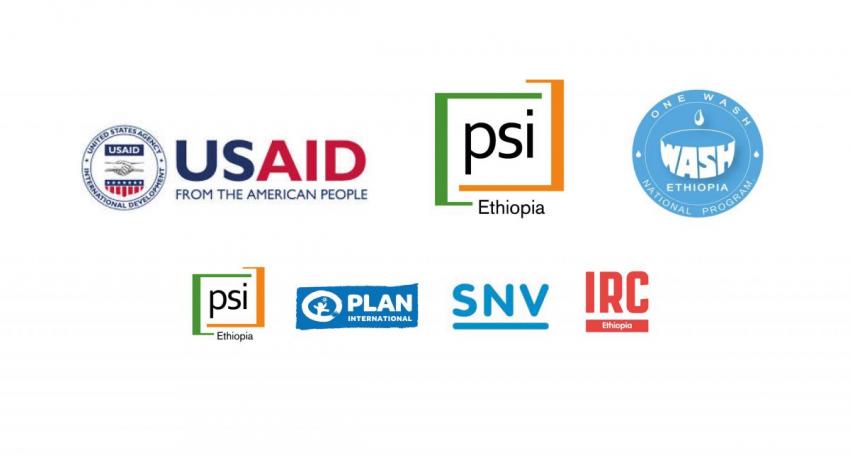What challenges are women in water, sanitation and hygiene (WASH) businesses facing in Ethiopia?
Published on: 16/11/2020
“It is not only “glass ceilings” limiting women’s career progress but also “glass floors” and “glass walls” blocking gender equality in the workplace” Barbara Crossette
In Ethiopia, women-led businesses make up less than 10 percent of the construction sector, which is the primary source of WASH products and services in the country. This makes the sector one of the most challenging for the promotion of women as business leaders.
Why is it so difficult for women to succeed in business in the WASH sector? We’ve summarised five key challenges for women in construction-related businesses (e.g. retailers, masons, small- and medium-sized construction companies, slab manufacturers) based on a comparative study involving 15 female and 15 male business people in five regions of Ethiopia conducted by USAID Transform WASH.

Women installing SaTo pan in Ethiopia (photo by Ayatam Simeneh from PSI Ethiopia)
Less capital: Female entrepreneurs reported access to two and a half times less capital on average than their male counterparts (approximately 250,000 ETB vs 100,000 ETB).
Poor networking opportunities: Unlike their male counterparts, who experience no problems travelling wherever they wish to network with anyone they meet, for female entrepreneurs networking comes with uncomfortable realities. Culturally, there is a gross misunderstanding and disapproval of women’s efforts to network as it often equates with infidelity or immorality. Women’s freedom of mobility in neighbourhoods outside of their own and in remote rural areas is curtailed by fear of social disapproval and even sexual assault, which are not uncommon occurrences. In addition, women’s traditional household responsibilities deprive them of men’s ample opportunities to travel and meet business associates. Not being able to network often translates into poor access to information, technology or products, making women entrepreneurs less likely to be early adopters of innovations and new product ideas.
Less support and attention from business ‘enablers’: The government has an important role to play in facilitating business growth in the WASH sector. Unfortunately, civil servants in local positions of power are not always gender sensitive or committed to supporting women in business. This primarily arises from their gender blindness, “a lack of awareness about how men and women are differently affected by a situation due to their different roles, needs, status and priorities in their societies.” For instance, our research found that many WASH focal persons in woreda health offices genuinely believe that female entrepreneurs are ineffective at any work involving physical labour and travel. This is happening in several regions despite evidence that women can perform well in such businesses provided that more attention is given to their particular needs.
Negative community stereotypes: Women who are engaged in construction-related businesses are often subjected to derogatory and discouraging words from fellow community members, especially those working in manufacturing and promotion. Some comments observed during the research included, “Why doesn’t she simply get married and have kids instead of messing with men’s jobs!” “Why does she run this filthy business with toilets while she has other ways of making a living?” “Doesn’t she have something of importance to do rather than wandering around the community talking nonsense about adopting improved sanitation?”
Difficult supervision of employees: In a patriarchal society like Ethiopia, the legitimacy of women’s rights and power is constantly challenged. Our research confirmed the frequent challenges that women face exercising authority or earning respect for their expertise. A female manager of an enterprise in Woliso woreda expressed her frustration this way: “When my employees don’t perform well or don’t show up on time at the workplace, and I reduce their compensation accordingly, they question my right [to manage them], and they try to undermine me simply because of my gender, totally ignoring their own issues. They deflect their own personal problems, blaming it on women’s lack of management skills.” A woman working as a retailer in Ebinat town reported that the daily laborers with whom she engages to load and unload cement express a lack of respect for her and often insult her when she tries to guide them on where to store the cement. “They say, ‘shut up, this is our task,’ while doing everything they are told by male employees.”
Women entrepreneurs who offer WASH products and services operate their businesses in the face of multiple cultural challenges, derogatory expressions, and stereotypical attitudes. Their limited freedom of mobility, ability to socialise and network, and manage their employees comprise some of these challenges. To address these issues, we recommend the following actions to reverse the impact of negative gender norms:
USAID Transform WASH aims to improve water, sanitation and hygiene (WASH) outcomes in Ethiopia by increasing market access to and sustained use of a broader spectrum of affordable WASH products and services, with a substantial focus on sanitation. Transform WASH achieves this by transforming the market for low-cost quality WASH products and services: stimulating demand at the community level, strengthening supply chains, and improving the enabling environment for a vibrant private market.
USAID Transform WASH is a USAID-funded activity implemented by PSI in collaboration with SNV, Plan International, and IRC WASH. The consortium is working closely with government agencies, including the Ministry of Health, the Ministry of Water, Irrigation and Electricity, the One WASH National Program, and regional and sub-regional governments.

At IRC we have strong opinions and we value honest and frank discussion, so you won't be surprised to hear that not all the opinions on this site represent our official policy.